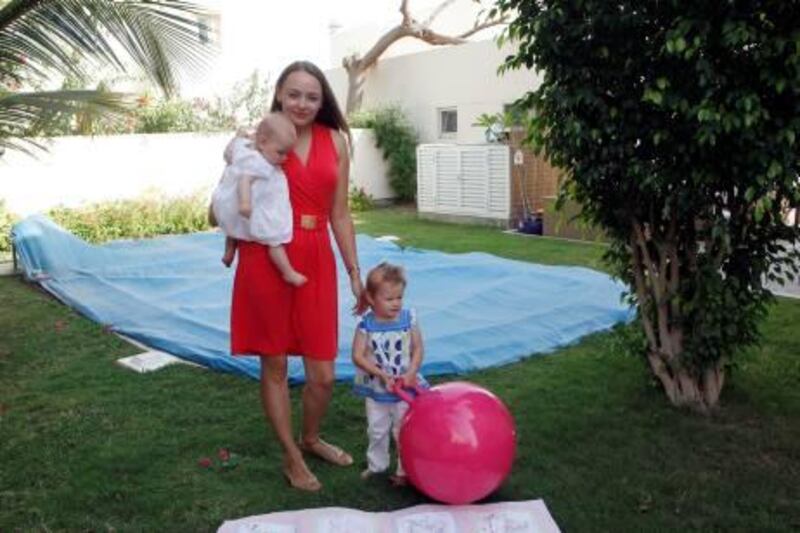DUBAI // Parents with private pools have been urged to keep closer watch on their children, days after an eight-year-old girl drowned at a villa in Emirates Hills.
"It is the responsibility of parents to take care of children when they have pools at their homes," Redha Hassan Salman, the director of public health and safety of the Dubai Municipality, said.
Parents should be particularly vigilant if their children cannot swim, he said. "We inspect public pools, but not private pools. Our regulations govern private pools only during their construction by the developers. In that stage, we check the requirements in design."
The renewed concern follows the death of the Indian playback singer KS Chitra's daughter Nandana, who drowned on April 14 after falling into a pool at a family friend's Dubai villa. Nandana wandered outside after her mother placed her in front of a bedroom television to watch cartoons, then left the room to shower, friends said.
Dubai police also cautioned parents against leaving children unattended at pools and beaches after finding that a quarter of the 36 recorded drownings in the first six months of last year involved people under the age of 18.
To improve safety, pools inside hotels, residential complexes and other public spaces follow stringent regulations. These include having a qualified lifeguard on duty, life rings, first-aid equipment and barricading to prevent children from entering the pool area on their own.
Authorities say they are still working towards full compliance with the regulations.
"We conduct regular inspections. We have 88 to 90 per cent compliance," Mr Salman said.
Officials have warned several times that public pools that repeatedly violate safety standards could be shut down.
Several parents with private pools say they must constantly watch their children to ensure their safety. Many have fenced their pool areas to stop children's access.
Daniya Jackson, of Jumeirah, has taken an extra step to keep her family safe. When her daughter turned 1, she drained their pool and had it covered.
"I took the extreme step because pools here are built without consideration for young children," the Russian expatriate said. "The landlords are reluctant to put a fence around the pools and doing so yourself can be expensive, especially if you are staying at a property for only a short time."
Mrs Jackson has also had the lawn area leading to the pool fenced so that her daughter, now 2, does not wander to the covered poolside on her own. She has another daughter, five months.
The Jacksons also continue to keep a close vigil on theirchildren, even at hotel pools.
"There are lifeguards even at the children's pool. But it is our responsibility to watch them," Mrs Jackson said.
She said nannies and pool staff should also be aware of the dangers and urged them to avoid leaving children unattendedand to keep doors leading to pool areas locked.
Muriel Landais has also taken extra safety measures. "I put a wooden fence around the pool and had separate locks installed on the doors that led to the pool," said Ms Landais, who has two children, age 5 and 9. "When they were younger, I always ensured the entrance to the pool was locked and I never left them alone in public or private pools."
The French expatriate said she encouraged her children to learn to swim as soon as they were able, to ensure their safety.
"Even though they know swimming, they are never left unsupervised near pools," she said. "We always watch them since it is the responsibility of the family. It is not possible to put a law everywhere."
Mareana Correas, who lives in Jumeirah, never leaves her daughters, aged 1 and 3, alone.
"We use the community pool, which has a fence around it, and there is a lifeguard on duty at all times. Even with these safety measures in place, I never leave my kids alone near a pool," the Argentinian expatriate said.
"My children always have floaters on while swimming, but I need to be there to keep an eye on them, too," she said.
Pool rules:
Dubai Municipality regulations concerning public pools:
• A qualified lifeguard must be on duty when people are swimming.
• If children’s pools are attached to the main pool used by adults, a barricade or obstruction should be in place to prevent children from entering the main pool.
• A life ring should be provided.
• Adequate safety equipment and a first-aid box should be available.
• Resuscitation equipment must be provided at all commercial and public pools.
• All areas of the pool must be clearly visible from lifeguard posts.
• Adequate artificial light must be provided.
* The National






